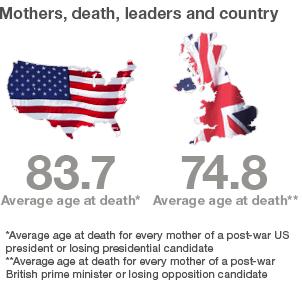The longevity of US presidents' mothers
- Published

The mothers of US presidents and presidential candidates live far longer than the mothers of British prime ministers and opposition leaders. Is that just a statistical quirk?
Recreational statistics might not sound like your idea of fun but fiddling with numbers can yield fascinating discoveries.
Mike Shearing, a More or Less listener in Malaysia, thought he was on to something when he noticed that the mothers of post-war US presidents seem, on the whole, to have lived very long lives - much longer than the mums of British prime ministers.
He contacted More or Less to ask whether he had found something significant. The short answer is that he had. More or Less collated the age of death for every mother of a post-war US president or losing presidential candidate - except those who're still alive, of course - and for the mothers of every post-war British prime minister and losing opposition leader.
We analysed the data with the help of Dr George Leeson from Oxford University's Institute of Ageing.
"If we look at the US mothers we have an average age at death equal to 83.7 years," says Leeson, "and if we look at the UK mothers we have an average age at death of 74.8."
That's a big difference. Averages can be misleading, however, because a small number of outliers - or extreme measurements - can distort the picture. Rose Kennedy, for example, lived to 104. So Dr Leeson calculated the median figures, too.
"The median divides the data into two equal halves," he says, "so 50% of the observations are higher than the median, and 50% are lower. And the median is therefore less sensitive to outliers. The median for the US mothers is 84.5 - so very close to the average. For the UK mothers the average was almost 75, and the median is 76. So there's very little difference. It's not outliers."
Leeson used data for white women in the United States because there is a significant gap in life expectancy between the black and white populations. All presidents' mothers have been white.
The difference, then, is real. But could it simply be coincidence? We are, after all, talking about a sample of just 35 women. Small samples are more likely to generate spuriously significant results.
One way to get a sense of how surprised we should be by these results is to compare the mothers to their cohort life expectancy. In other words: did they outlive their peers, women born in the same year?
Leeson says the first woman analysed was born in the 1840s (Ellen Bravery Watson, Clement Attlee's mother) and the last in the 1940s (Ann Dunham, Barack Obama's mother). In each of those decades cohort life expectancy was longer in Britain than in America. That makes Leeson's next discovery all the more surprising. The presidents' mothers not only outlived their own peers, they outlived the equivalent cohort of British women as well.
"The UK mothers are outliving their peers," says Leeson, "quite significantly. The US mothers are also outliving their peers. However, what is fascinating is that the US mothers are living much longer than the comparable cohorts of UK prime ministers' mothers."
So there is an advantage to being the mother of a leader, in both countries, but the advantage is much more meaningful in the United States. The obvious next question is: why?
Leeson speculates that one explanation might be the fact that while most leaders on both sides of the Atlantic have come from relatively prosperous families, wealth buys better healthcare in the United States than in Britain.
"Because of the socio-economic status of both groups the advantage in the US could be that that socio-economic status would enable you to buy better care, especially late-life care, than would be available in the UK."
Even if a future president does not come from a prosperous family, his mother might benefit from the trajectory of her illustrious son's life. To be on course to run for office later in life, he is likely to achieve an elevated and well-rewarded position early in his career (and perhaps, therefore, to be in a position to buy first-rate late-life healthcare for his mum).
If that explanation is correct one would expect to see greater inequality of life expectancy generally in the US than in Britain. And, indeed, Leeson says that is the case. Life expectancy varies a great deal across Britain - residents of Kensington in London can expect to live 10 or 12 years longer than those of Glasgow - but such inequality is even greater in the United States.
Dr Leeson and his colleagues at Oxford University are so intrigued by More or Less listener Mike Shearing's observation, they plan to study the data more closely. They even hope to write an academic paper about it, which goes to show that amateur statisticians can make discoveries worthy of academic scrutiny.
With additional reporting by Fiona Woods